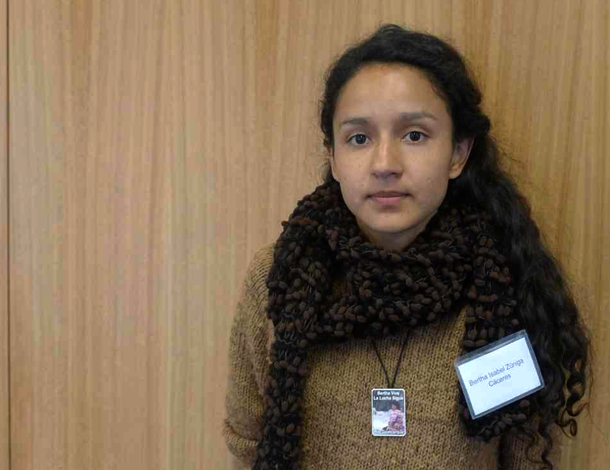The daughter of Berta Cáceres, the Honduran human rights defender who was murdered this month, has spoken out about the country’s volatility and called on Europe and the US to stop investing in the controversial Agua Zarca dam.

Bertha, and members of Copinh, want a special commission to investigate her mother’s death so that the killers can be brought to justice.
She is critical of the government’s handling of the investigation, which she says is being carried out in secret. The family has not even been told the official date of Berta’s death. Most reports say she was shot on 3 March, but Gustavo Castro Soto, a Mexican activist who was injured in the shooting and is the only eye witness, said she was killed late on 2 March.
Bertha believes that high-ranking members of the Honduran military and state have investments in the dam.
This week, Bertha, who is studying for a masters degree in Latin American studies in Mexico, is in New York to speak at side events during the annual Commission on the Status of Women. She wants to gather support for an independent investigation into Berta’s death and raise the profile of the campaign for justice.
“I had not planned at all [to come to CSW]. I was living in a completely different situation, studying,” she says. But her mother’s murder “turned everything around and now I’m taking advantage of every possible space to talk about my mother … I will talk about the situation in Honduras. This is not the first assassination, but one of a series of assassinations of human rights defenders … I don’t want another human rights defender to be assassinated”.
Honduras is one of the most dangerous countries to be an environmental activist. Between 2010 and 2014, 101 activists were killed.
As we spoke, a call came through from Copinh’s lawyer to say another member of the organisation had been shot dead and another man taken during forced evictions in the region by the police. The dead man was identified as Nelson García, 38, who was shot by unidentified gunmen after a violent eviction by Honduran security forces in a Lenca indigenous community.
While in New York, Bertha will address the UN general assembly and meet representatives from the Dutch, Norwegian and US governments. The Dutch development bank FMO is one of the investors in the dam. She wants to convince the Dutch and Norwegian governments to apply pressure on European investors to withdraw from the project, and for the US government to reconsider its heavy investment in the country. The US is spending millions of dollars supporting security in Honduras to stem the flow of illegal immigrants.
On Wednesday, FMO said it was suspending all its activities in Honduras in light of the murders of Cáceres and Garcia.
It said: “The right of speech for those who speak up for their rights and the livelihoods of people are of very high value to FMO … FMO decided to suspend all activities in Honduras, effective immediately. This means that we will not engage in new projects or commitments and that no disbursements will be made, including the Agua Zarca project.”
On Thursday, indigenous groups in Honduras will march through its cities demanding justice for Berta. At the same time in New York, a rally will be held outside the Honduran mission to the UN.
“I remember my mother as a person with a big vision and a person of action,” Bertha said. “She taught me not to be afraid, to have courage. She encouraged us to break barriers, to act on our desires. She taught us to have a love of life and she had a big spirit … it feels like she is still with us and is helping us face this awful situation.”
This article was amended on 16 March 2016 to add FMO’s suspension of its activities in Honduras. This content is republished as part of our content partnership with the Guardian and Mama Cash.
